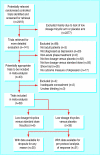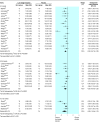Meta-analysis of effects and side effects of low dosage tricyclic antidepressants in depression: systematic review
- PMID: 12411354
- PMCID: PMC131022
- DOI: 10.1136/bmj.325.7371.991
Meta-analysis of effects and side effects of low dosage tricyclic antidepressants in depression: systematic review
Abstract
Objective: To compare the effects and side effects of low dosage tricyclic antidepressants with placebo and with standard dosage tricyclics in acute phase treatment of depression.
Design: Systematic review of randomised trials comparing low dosage tricyclics (< or =100 mg/day) with placebo or with standard dosage tricyclics in adults with depression.
Main outcome measures: Relative risk of response in depression (random effects model), according to the original authors' definition but usually defined as 50% or greater reduction in severity of depression. Relative risks of overall dropouts and dropouts due to side effects.
Results: 35 studies (2013 participants) compared low dosage tricyclics with placebo, and six studies (551 participants) compared low dosage tricyclics with standard dosage tricyclics. Low dosage tricyclics, mostly between 75 and 100 mg/day, were 1.65 (95% confidence interval 1.36 to 2.0) and 1.47 (1.12 to 1.94) times more likely than placebo to bring about response at 4 weeks and 6-8 weeks, respectively. Standard dosage tricyclics failed, however, to bring about more response but produced more dropouts due to side effects than low dosage tricyclics.
Conclusions: Treatment of depression in adults with low dose tricyclics is justified. However, more rigorous studies are needed to definitively establish the relative benefits and harms of various dosages.
Figures




Comment in
-
Low dosage tricyclic antidepressants in depression. Giving low dose tricyclics is not justified by evidence.BMJ. 2003 Mar 1;326(7387):499; author reply 499. doi: 10.1136/bmj.326.7387.499/a. BMJ. 2003. PMID: 12609953 Free PMC article. No abstract available.
-
Review: low dose was as effective as standard dose tricyclic antidepressants in adults with depression.ACP J Club. 2003 Mar-Apr;138(2):52. ACP J Club. 2003. PMID: 12614137 No abstract available.
-
Low dosage tricyclic antidepressants in depression. Evidence to change current guidelines is insufficient.BMJ. 2003 Mar 1;326(7387):499; author reply 499. BMJ. 2003. PMID: 12617073 No abstract available.
-
Low dosage tricyclic antidepressants in depression. Non-superiority does not equal equivalence.BMJ. 2003 Mar 1;326(7387):499; author reply 499. BMJ. 2003. PMID: 12617074 No abstract available.
-
Review: Low dose tricyclic antidepressants may be effective for adults with acute depressive disorder.Evid Based Ment Health. 2003 May;6(2):46. doi: 10.1136/ebmh.6.2.46. Evid Based Ment Health. 2003. PMID: 12719353 No abstract available.
-
Low-dose tricyclics effective for depression.J Fam Pract. 2003 May;52(5):356-7. J Fam Pract. 2003. PMID: 12737763 No abstract available.
References
-
- Lawrenson RA, Tyrer F, Newson RB, Farmer RD. The treatment of depression in UK general practice: selective serotonin reuptake inhibitors and tricyclic antidepressants compared. J Affect Disord. 2000;59:149–157. - PubMed
-
- Pincus HA, Tanielian TL, Marcus SC, Olfson M, Zarin DA, Thompson J, et al. Prescribing trends in psychotropic medications: primary care, psychiatry, and other medical specialties. JAMA. 1998;279:526–531. - PubMed
-
- Sleath BL, Rubin RH, Huston SA. Antidepressant prescribing to Hispanic and non-Hispanic white patients in primary care. Ann Pharmacother. 2001;35(4):419–423. - PubMed
-
- Roberts E, Norris P. Growth and change in the prescribing of anti-depressants in New Zealand: 1993-1997. N Z Med J. 2001;114:25–27. - PubMed
-
- Depression Guideline Panel. Clinical practice guideline: depression in primary care 2: treatment of major depression. Rockville, MD: US Department of Heath and Human Services, Agency for Health Care Policy and Research; 1993. . [AHCPR Publication 93-0551.]
Publication types
MeSH terms
Substances
LinkOut - more resources
Full Text Sources
